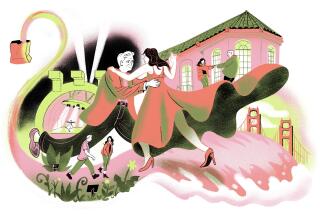Love at Second Sight : WALKING PAPERS<i> by Jay Cronley (Random House: $16.95; 295 pp.) </i>
- Share via
Divorce squashes John Grape. A writer well into middle age and well past his only successful novel, a smoker, a drinker, a compulsive gambler, petulant and overweight (“He reminded himself of a candle that was melting”), he listens in horror as a lesbian judge--or at least a judge who shares a condo with a Roller Derby queen--awards his ex-wife most of his money and his prized Connecticut home. He goes berserk in court and is jailed for contempt. Weeks later, he repairs to a bar.
Something odd has happened. After Jay Cronley (“Funny Farm”) has taken great pains to reveal him as utterly lacking in inner resources, our hero seems to be developing some. He has, in fact, become a Grape of wrath. He tells the bartender that he plans to write a book about a divorced man:
“He quits eating, loses 30 or 40 pounds. . . . He gets a new face. Nose. The chins go. . . . Eyes, skin.”
“And she’ll remarry him because he’s such a nice guy?”
“Something like that.”
”. . .So what’s the big finish?”
“She doesn’t know it’s him.”
“You’re right,” the bartender says. “That’s better than killing her.”
There’s more. The bartender, a literary sophisticate beneath his tattoos, raises the question of motivation: “The way I see it is that people don’t change because they’re never really desperate enough to compromise their standards, to quit doing what they enjoy. . . . The critics will nail you on it.”
And more yet. After Grape has spent his last $30,000 on a fat farm, a plastic surgeon, a hair-transplant salon and a ballet school, after he has had his teeth capped, changed his eye color with contacts, adopted an alias, taken up jogging, abandoned all his vices and attained a Zen-like calm, after he has started dating his ex-wife, Deloris, and fallen in love with her all over again, his agent tries to peddle just such a book to a Hollywood producer:
“The parting of the Red Sea is a caper, this is a caper. What I’ve got for you operates on a number of levels. Love, hate, revenge, intrigue, it’s all here. . . . It’s not fiction. He’s doing it.”
Cronley is a wise guy: He wants to have it all ways at once. He disarms would-be critics while thumbing his nose at them. He points out doubtful areas in the novel (Grape is nuts, though it’s uncertain whether we’re supposed to think so; Deloris doesn’t deserve such a fiendish revenge--nor does she deserve him, really, in his new incarnation), yet he wants us to believe that, between laughs, he has indeed written a vintage fable about the dark side of the American dream of self-transformation.
None of which matters as much as it might. What Cronley has really done is write a whole book of one-liners, which isn’t easy. The John-Deloris story is a device that lets him snipe at milieus from Beverly Hills to welfare hotels and skewer a voodoo-doll collection of minor characters, from fitness gurus to cab drivers to daughters in college. “Walking Papers” is a tale of atrocious bad luck, a plantation of banana peels, cynical, misanthropic and often very funny. Cronley has a dead-on ear for the American cliche, and if he sometimes takes cheap shots--at lesbian judges, for instance--he also taps into resentments that most of us enjoy wallowing in now and then.
Try an experiment. Drink--well, wine if you insist, but this is more of a beer book. Drink four or five beers in the kind of bar that has wobbly stools and faded calendars and somebody-done-somebody-wrong songs on the jukebox, and brood on your misfortunes. See if before long you don’t decide “Walking Papers” goes down pretty smoothly as a chaser.
More to Read
Sign up for our Book Club newsletter
Get the latest news, events and more from the Los Angeles Times Book Club, and help us get L.A. reading and talking.
You may occasionally receive promotional content from the Los Angeles Times.










